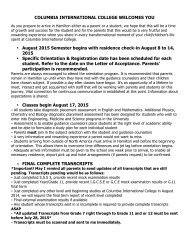french
You also want an ePaper? Increase the reach of your titles
YUMPU automatically turns print PDFs into web optimized ePapers that Google loves.
J'y vais. - I'm going there.<br />
Tu y vas. - You're going there.<br />
Nous y allons. - We're going there.<br />
The negative form of aller with the y pronoun has both the verb and pronoun enclosed between ne and pas.<br />
Il n'y va pas. - He's not going there.<br />
Futur Proche<br />
The structure aller + infinitive is used to say that something is going to happen in the near future.<br />
Il va pleuvoir demain. - It's going to rain tomorrow.<br />
Il va faire froid. - It's going to be cold.<br />
Remember that the negative goes around the conjugated verb.<br />
Idioms<br />
Liaison<br />
Il ne va pas pleuvoir demain. - It's not going to rain tomorrow.<br />
Allons-y - ahlonzee - Let's go! (impératif)<br />
Ça va? - How are you? (lit: It goes?)<br />
On y va! - Let's get going!<br />
On y va? - Should we go?<br />
Usually, whenever a vowel sound comes after ...ons or ...ez, the usually unpronounced s and z change to a<br />
sharp z sound and link to the next syllable. (This process is called liaison.) However, since allons and allez<br />
begins with vowels, nous allons is pronounced nyoozahloh and vous allez is pronounced voozahlay. In order<br />
to have a pleasing and clean sound, two liaisons should not go consecutively. There is therefore no liaison in<br />
allons à when it comes right after nous and allez à when it comes after vous.<br />
In the phrase Vous allez à l'école?, vous allez à is pronounced vouzahlay ah.<br />
In the phrase vous et Marie allez à l'école?", allez à is pronounced ahlayzah.




